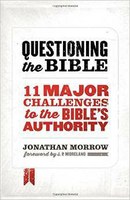Questioning the Bible - 11 major challenges to the Bible's authority
Kevin Moss | October 2014 - Highfields Book of the Month
By Jonathan Morrow - 2014 Chicago: Moody
 This is the title of a brand new book by Jonathan Morrow, whom I 'met' during a Skype interview whilst on my Biola University residency in June. Jonathan is a graduate of Biola, and one of a characteristic bunch of men and women I met whilst out there – thoughtful, considered, substantive and extremely well-read.
This is the title of a brand new book by Jonathan Morrow, whom I 'met' during a Skype interview whilst on my Biola University residency in June. Jonathan is a graduate of Biola, and one of a characteristic bunch of men and women I met whilst out there – thoughtful, considered, substantive and extremely well-read.
Questioning the Bible was published earlier this August, and I was excited to receive my own copy the other day. It's subtitle is "11 major challenges to the Bible's authority", and Morrow sets out to lay to rest these very common views that get repeated ad-nauseum, and to such an extent that even thinking Christians must at times entertain the sneaking suspicion that there is some substance to them.
The author provides succinct, well-referenced chapters on the following kinds of topic:
Is the Bible anti-intellectual?
What can we really know about Jesus?
How can we know what the earliest Christians believed?
Has the Biblical text been corrupted over the centuries?
Are the Gospels full of contradictions?
Is the Bible unscientific?
And there's another five to boot – plus a challenging conclusion and some useful appendices.
It's not a long book – at 192 pages (excl references and appendices) it doesn’t take long to read at all. It's not a complicated book – and because it is not aimed at academics, it doesn't come loaded with pretensions, and it is pretty conversational in tone. In short, it's the kind of book that any of us might want to read in order to form a realistic opinion on the reliability of the Bible. But that's not the same thing as saying that it's lightweight: Morrow's bibliography gives you access to all the solid background reading that you might wish to look deeper into. And his analysis of the basis of much of the new atheists' attack on the Bible is sufficient to demonstrate how one-dimensional and circular such skeptical reasoning usually is.
For anyone seeking to understand why they might seriously read the Bible, and trust what it has to say, I would commend this book. It is readable but realistic, and scholarly without being academic. It will help Christians to be confident about Scripture, and I think it would usefully challenge the often unconsidered excuses for skepticism that we frequently encounter.
Document Actions

